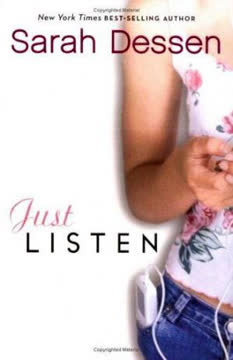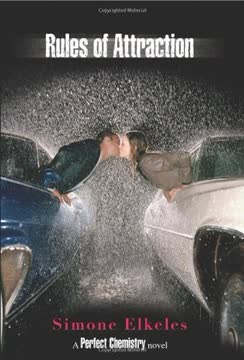Plot Summary
Commercial Fame and School Dread
Annabel Greene, a high school junior, becomes unexpectedly famous due to a commercial she filmed. Despite the glamour, her life is far from perfect. She dreads facing her former best friend, Sophie, at school after a mysterious falling out. Annabel feels isolated, haunted by past summer events, and struggles with the pressure of maintaining a facade of normalcy. Her fame contrasts sharply with her internal turmoil, setting the stage for her journey of self-discovery.
Sophie's Betrayal and Isolation
Annabel reflects on her friendship with Sophie, which ended abruptly after a party where Sophie accused her of betrayal. Now, Sophie openly insults Annabel, leaving her isolated. The tension is palpable, and Annabel navigates the social minefield of high school alone, reflecting on the fragility of friendships. This chapter highlights the impact of misunderstandings and the loneliness that follows, deepening Annabel's sense of isolation.
A New Friend in Owen
Annabel finds an unlikely ally in Owen Armstrong, a fellow student known for his intimidating presence and love of music. Despite his reputation, Owen is honest and straightforward, offering Annabel a refreshing change from the deceit and drama surrounding her. Their friendship grows as they bond over music, providing Annabel with a sense of belonging she desperately needs. Owen's influence encourages Annabel to confront her fears and embrace honesty.
Family Struggles and Secrets
Annabel's family is dealing with its own issues, particularly her sister Whitney's eating disorder. The family's focus on Whitney's recovery adds pressure to Annabel, who feels overshadowed and burdened by the need to keep up appearances. Her mother is deeply involved in her daughters' modeling careers, adding complexity to Annabel's life as she grapples with her own desires and identity. This chapter explores the impact of family dynamics on Annabel's personal struggles.
Facing Truths and Confrontations
Encouraged by Owen's straightforwardness, Annabel begins to confront her fears and the lies she's been telling herself and others. She struggles with the idea of quitting modeling, a decision that would disappoint her mother, and the need to clear the air with Sophie. Annabel's journey is one of self-discovery, as she learns the importance of honesty and the courage it takes to face the truth. This chapter marks a turning point in Annabel's journey towards self-acceptance.
Confrontation and Confession at Last
Annabel finally faces Owen, revealing the truth about the night at the party and her subsequent silence. Owen listens, offering understanding and support, which helps Annabel realize the importance of sharing her story. This confrontation is a turning point, allowing Annabel to acknowledge her fears and the impact of her silence, and to begin the process of healing by deciding to testify against Will Cash. This chapter underscores the power of truth in overcoming past traumas.
Facing the Music Together
Despite being grounded for punching Will, Owen promises to support Annabel at the courthouse. Annabel testifies, confronting Will and her past. Owen's presence, even if delayed, reassures her. This chapter highlights the power of support and the courage it takes to face one's fears, as Annabel takes a significant step towards justice and closure. The courtroom scene symbolizes Annabel's bravery and the importance of standing up for oneself.
Family Bonds and New Beginnings
Annabel's family comes together, supporting her through the trial. Whitney's recovery and Kirsten's success in filmmaking reflect the family's healing and growth. Annabel's confession to her family about the assault strengthens their bond, showing the importance of honesty and support in overcoming trauma. This chapter emphasizes the healing power of family unity and the potential for new beginnings.
A New Voice on Air
Annabel takes over Owen's radio show, discovering a new way to express herself. The experience helps her gain confidence and find her own voice, both literally and metaphorically. The radio show becomes a symbol of her growth and the new chapter in her life, as she learns to communicate and connect with others. This chapter highlights Annabel's transformation and the empowerment that comes from self-expression.
Truth and Reconciliation
Annabel reconciles with Clarke, and they begin to rebuild their friendship. Emily's courage inspires Annabel to be honest and face her fears. The chapter emphasizes the themes of forgiveness, understanding, and the power of truth in healing relationships and moving forward. Annabel's journey comes full circle as she embraces honesty and reconciliation, paving the way for a brighter future.
Characters
Annabel Greene
Annabel is a high school junior caught between the pressures of her modeling career and the fallout from a broken friendship. She is introspective and sensitive, often avoiding confrontation to keep the peace. Her journey is one of self-discovery, as she learns to navigate the complexities of honesty and personal growth. Annabel's evolution from silence to speaking out is a testament to her courage and resilience.
Sophie Rawlins
Sophie is Annabel's ex-best friend, who now openly antagonizes her. Once the most popular girl in school, Sophie's relationship with Annabel soured after a misunderstanding involving her boyfriend. Her hostility towards Annabel is a constant reminder of the fragility of high school friendships. Sophie's character highlights the impact of betrayal and the challenges of navigating social dynamics.
Owen Armstrong
Owen is a tall, intimidating student with a passion for music and a commitment to honesty. Despite his tough exterior, he becomes a supportive friend to Annabel, encouraging her to be truthful and confront her fears. His straightforward nature provides a stark contrast to the deceit and drama in Annabel's life. Owen's influence is pivotal in Annabel's journey towards self-acceptance and healing.
Whitney Greene
Whitney is Annabel's older sister, whose battle with an eating disorder has deeply affected the family. Her illness is a source of tension and concern, overshadowing Annabel's own struggles. Whitney's journey towards recovery is fraught with challenges, impacting her relationship with her family. Whitney's story emphasizes the importance of resilience and support in overcoming personal challenges.
Grace Greene
Annabel's mother is deeply involved in her daughters' modeling careers, often prioritizing their success over their personal well-being. She is supportive but overwhelmed by Whitney's illness and the demands of maintaining a perfect family image. Her relationship with Annabel is strained by unspoken expectations and pressures. Grace's character highlights the complexities of parental expectations and the impact on family dynamics.
Kirsten Greene
Kirsten is Annabel's other sister, who has moved to New York to pursue modeling and school. She is independent and outspoken, often clashing with her family's expectations. Her decision to quit modeling and focus on her education serves as a catalyst for Annabel's own self-reflection. Kirsten's journey underscores the importance of pursuing one's passions and the courage to defy expectations.
Emily Shuster
Emily's decision to press charges against Will and her courage in facing the trial inspire Annabel to confront her own fears. Emily's strength and resilience serve as a catalyst for Annabel's journey towards truth and justice, highlighting the impact of one person's courage on another's healing process. Emily's character embodies the power of bravery and the influence of positive role models.
Plot Devices
Music as a Connection
Music plays a crucial role in Annabel's relationship with Owen, serving as a medium for connection and understanding. Owen's passion for music and his radio show introduce Annabel to new perspectives, encouraging her to be honest and confront her fears. Music becomes a symbol of truth and self-expression, guiding Annabel on her journey of self-discovery. This plot device underscores the transformative power of music in personal growth.
Music as a Catalyst
Music continues to play a crucial role in Annabel's life, serving as a medium for connection and self-expression. Her involvement in Owen's radio show symbolizes her growth and newfound confidence. Music becomes a catalyst for change, helping Annabel find her voice and navigate her journey towards healing and reconciliation. This plot device highlights the role of music in fostering personal transformation and empowerment.
Analysis
"Just Listen" by Sarah Dessen explores the complexities of identity, the impact of silence, and the power of truth. Through Annabel's journey, the novel delves into themes of honesty, self-discovery, and the courage it takes to confront one's fears. The story highlights the importance of support, both from family and friends, in overcoming personal challenges. Music serves as a powerful symbol of connection and self-expression, guiding Annabel towards healing and reconciliation. The novel ultimately emphasizes the transformative power of truth and the potential for new beginnings, offering readers a poignant exploration of personal growth and resilience.
Last updated:
FAQ
0. Synopsis & Basic Details
What is Just Listen about?
- A Teen's Silent Struggle: Just Listen follows Annabel Greene, a high school junior whose seemingly perfect life as a local model unravels after a traumatic summer event. She navigates intense social isolation, family secrets, and the burden of unspoken truths, struggling to find her voice amidst betrayal and misunderstanding.
- Unlikely Friendship's Catalyst: The narrative explores Annabel's unexpected friendship with Owen Armstrong, an intense, music-obsessed outcast who champions honesty. His directness challenges Annabel's ingrained people-pleasing tendencies and her habit of internalizing pain, pushing her towards self-discovery and confrontation.
- Healing Through Truth: The core of the story, a powerful Just Listen analysis, centers on Annabel's journey to confront a sexual assault, reconcile with estranged friends, and mend fractured family relationships. It's a poignant exploration of how finding one's voice and embracing truth, however difficult, is essential for healing and moving forward.
Why should I read Just Listen?
- Deep Emotional Resonance: Readers should delve into Just Listen for its raw and honest portrayal of trauma, silence, and the arduous path to healing. Annabel's internal struggle with shame and fear, contrasted with her yearning for connection, offers a deeply empathetic and relatable experience, making it a powerful read for anyone who has felt unheard.
- Compelling Character Arcs: The novel excels in its character development in Just Listen, particularly Annabel's transformation from a passive, people-pleasing girl to a courageous young woman who reclaims her narrative. The nuanced portrayals of secondary characters, like Owen and Annabel's sisters, add layers of complexity and demonstrate the varied ways individuals cope with pain and change.
- Themes of Authenticity & Voice: Sarah Dessen masterfully explores profound themes in Just Listen, such as the importance of authenticity, the danger of silence, and the liberating power of speaking one's truth. The story encourages readers to reflect on their own relationships with honesty and the courage it takes to truly "just listen" to themselves and others.
What is the background of Just Listen?
- Contemporary High School Setting: The novel is set in a modern American high school environment, reflecting typical social hierarchies, cliques, and the pervasive influence of rumors and social media (though early 2000s era, with cell phones and iPods). This backdrop amplifies Annabel's isolation and the pressure to maintain a perfect facade, a common theme in Dessen's works.
- Cultural Pressures on Young Women: Just Listen delves into the cultural pressures placed on young women regarding appearance, popularity, and unspoken expectations. Annabel's modeling career, Whitney's eating disorder, and Sophie's obsession with Will Cash all highlight societal ideals of beauty and relationships, and the destructive impact of striving for an unattainable "perfect girl" image.
- Exploration of Trauma & Recovery: The book tackles sensitive subjects like sexual assault and eating disorders, providing a nuanced look at their impact on individuals and families. The inclusion of therapy (Moira Bell's unorthodox methods for Whitney) and the legal system (Emily's trial) grounds the emotional narrative in realistic pathways for recovery and justice, offering a deeper Just Listen explained perspective on these issues.
What are the most memorable quotes in Just Listen?
- "The best way out is always through.": This Robert Frost epigraph, chosen by the author, perfectly encapsulates Annabel's journey of confronting her trauma rather than avoiding it. It foreshadows the difficult but necessary path she must take to heal, highlighting the central themes in Just Listen of perseverance and courage.
- "Silence is so freaking loud.": Owen Armstrong's profound observation about the deafening nature of unspoken thoughts and feelings (Chapter 8) becomes a recurring motif and a key insight into Annabel's own internal world. This quote powerfully articulates the burden of her secrets and the psychological toll of her silence, a crucial element in Annabel Greene's motivations.
- "There has to be a middle. Without it, nothing can ever truly be whole.": Whitney's realization during her open-mike reading (Chapter 16) about the importance of finding balance and connection, rather than existing in extremes, is a pivotal moment. It reflects her own healing journey and offers a universal truth about relationships and self-acceptance, providing a deeper Just Listen analysis of family dynamics.
- "Don't think or judge. Just listen.": Owen's repeated advice to Annabel, particularly regarding music (Chapter 9) and later, her own story (Chapter 18), becomes the novel's titular and most iconic phrase. It serves as a guiding principle for empathy, open-mindedness, and the core message of the book: the necessity of truly hearing and understanding, both others and oneself.
What writing style, narrative choices, and literary techniques does Sarah Dessen use?
- First-Person Introspective Narrative: Dessen employs a first-person point of view through Annabel, allowing readers deep access to her internal thoughts, fears, and emotional turmoil. This narrative choice is crucial for understanding Annabel's repressed trauma and her gradual journey toward self-awareness, making her Annabel Greene character development particularly intimate.
- Conversational & Accessible Tone: The writing style is largely conversational and relatable, mirroring the voice of a typical teenager, which makes complex emotional themes accessible to a young adult audience. This approach fosters a strong connection between the reader and Annabel, drawing them into her world and making her struggles feel immediate and authentic.
- Symbolism and Recurring Motifs: Dessen skillfully uses symbolism, such as the "glass house" representing superficial perfection and hidden truths (Chapter 3), and recurring motifs like music, silence, and the act of "listening." These elements enrich the narrative, providing subtle layers of meaning and foreshadowing that deepen the symbolism in Just Listen and Annabel's emotional journey.
1. Hidden Details & Subtle Connections
What are some minor details that add significant meaning?
- Owen's Kleenex Pack: The small, bent pack of Kleenex Owen offers Annabel after her panic attack (Chapter 5) is a subtle but powerful detail. It signifies his unexpected empathy and preparedness for emotional distress, hinting at his own past struggles and establishing him as a safe, understanding presence long before Annabel fully trusts him. This foreshadows his role as a confidante in Annabel Greene's emotional journey.
- The Car Wash Phenomenon: Annabel's explanation of the car wash making all music sound good (Chapter 12) initially seems like a quirky detail but symbolizes her desire for external validation and a filtered reality. It highlights her tendency to seek comfort in superficial experiences rather than confronting raw emotions, a key aspect of her Annabel Greene motivations before her transformation.
- Whitney's Herb Pots: The small herb pots Whitney plants for her therapy group (Chapter 9), initially seen as a "stupid exercise," become a powerful symbol of her slow, internal growth and resilience. Despite the winter setting, the eventual sprouting of the rosemary signifies hope and the quiet, persistent effort required for healing, connecting to Whitney Greene's eating disorder recovery.
What are some subtle foreshadowing and callbacks?
- "The girl who has everything" Commercial: The opening scene's commercial tagline, "The girl who has everything" (Chapter 1), is a stark and ironic foreshadowing of Annabel's internal emptiness and the facade she maintains. This early detail sets up the central conflict between her public image and private suffering, a recurring theme in Just Listen analysis.
- Owen's Rings - "Go F* Yourself" vs. "Or Not": Rolly's father, a jeweler, engraved two rings for Owen: one with "go f* yourself" (pre-anger management) and another with "or not" (post-anger management) (Chapter 8). This subtle detail perfectly encapsulates Owen's journey from explosive anger to controlled expression, foreshadowing his ability to guide Annabel through her own emotional confrontations and highlighting his Owen Armstrong character development.
- Kirsten's Film & Whitney's Essay: The parallel between Kirsten's filmmaking project about Whitney's bike accident and Whitney's therapeutic "history" essay (Chapter 9, 12) subtly foreshadows their eventual reconciliation and shared understanding. Both sisters revisit a past trauma from their unique perspectives, emphasizing that truth is multifaceted and healing comes from acknowledging different narratives, a key aspect of family dynamics in Just Listen.
What are some unexpected character connections?
- Whitney and Owen's Shared Music Taste: The surprising revelation that Whitney is an "Ebb Tide fan" with "imports" (Chapter 10), a band Owen considers "enlightened," creates an unexpected bond between them. This detail subtly connects two seemingly disparate characters through a shared appreciation for obscure music, hinting at Whitney's hidden depth and challenging Annabel's assumptions about her sister.
- Mallory as Annabel's Past Self: Mallory Armstrong, Owen's younger sister, initially appears as a superficial fan of Annabel's modeling, but her "girl who has everything" room (Chapter 11) serves as a poignant mirror to Annabel's past self. Mallory's idolization of Annabel's commercial image highlights the very facade Annabel is trying to shed, creating an unexpected reflection of Annabel's journey in Just Listen character analysis.
- Rolly's "Destiny" in Clarke: Rolly's unwavering belief that Clarke is his "destiny" after she "punched him in the face" (Chapter 14) is an unexpected and humorous connection that ultimately facilitates Annabel's reconciliation with Clarke. His persistent pursuit, fueled by a quirky origin story, provides the catalyst for Annabel to finally approach her estranged best friend, showcasing the ripple effect of seemingly minor interactions.
Who are the most significant supporting characters?
- Rolly, the Catalyst for Connection: Rolly, Owen's best friend and co-host, is significant not just for his quirky personality but as a crucial catalyst for multiple relationships. His "attacker" job and "perfect moment" philosophy (Chapter 14) directly lead to Annabel's re-engagement with Clarke, and his presence provides a lighter, more accessible entry point into Owen's world, enriching the character development in Just Listen.
- Moira Bell, the Unorthodox Healer: Whitney's therapist, Moira Bell, though never physically present, is a profoundly significant supporting character. Her unconventional assignments, like planting herbs and writing personal histories (Chapter 9, 12), are instrumental in Whitney's recovery and indirectly influence Annabel's understanding of healing and self-expression. Moira's methods challenge traditional approaches, offering a fresh perspective on mental health support in Just Listen explained.
- Hillary Prescott, the Gossip's Mirror: Hillary, a fellow model and "huge gossip" (Chapter 6), serves as a significant, albeit negative, supporting character by embodying the pervasive rumor mill that Annabel fears. Her constant probing and spreading of information about Emily and Will highlight the social pressures and judgment Annabel is trying to escape, underscoring the theme of reputation versus truth in themes in Just Listen.
2. Psychological, Emotional, & Relational Analysis
What are some unspoken motivations of the characters?
- Sophie's Deep Insecurity: Sophie's aggressive behavior and need for control, particularly over Will and her social circle, are driven by a deep-seated insecurity stemming from her parents' "ugly" divorce and her father's abandonment (Chapter 4). Her constant need to be "the most popular girl" and her swift accusations against Annabel reveal a fear of losing what little stability she perceives she has, a key aspect of Sophie Rawlins' motivations.
- Annabel's Fear of Disappointment: Annabel's pervasive people-pleasing and inability to express her true feelings, especially about quitting modeling, are motivated by a profound fear of disappointing her mother and disrupting the fragile family peace (Chapter 2, 4). Her mother's past depression makes Annabel believe she must maintain a "nice" facade to prevent further emotional collapse, highlighting Annabel Greene's psychological complexities.
- Grace's Need for Control/Perfection: Annabel's mother, Grace, is subtly motivated by a desire to maintain an image of a perfect, happy family, especially after her own struggle with depression and Whitney's eating disorder (Chapter 2, 3). Her enthusiastic involvement in Annabel's modeling and her initial dismissal of Whitney's illness stem from a need to control external appearances, reflecting a coping mechanism for past trauma and influencing Grace Greene's character analysis.
What psychological complexities do the characters exhibit?
- Annabel's Repression & Selective Memory: Annabel exhibits complex psychological repression, actively pushing away traumatic memories and emotions, leading to a "selective memory" (Chapter 17). Her physical reactions, like vomiting and a racing heart, are somatic manifestations of her unaddressed trauma, showcasing the body's response to psychological distress and the difficulty of confronting painful truths in Annabel Greene's emotional journey.
- Whitney's Control Through Restriction: Whitney's eating disorder is portrayed as a complex manifestation of her need for control in a life where she felt "between" and "broken" (Chapter 16). Her meticulous cooking and precise measurements, even in recovery, reveal a continued struggle for order and self-mastery, highlighting the intricate psychological battle against her illness and offering a deeper Whitney Greene eating disorder analysis.
- Owen's Managed Anger: Owen's "Anger Management" isn't about suppressing anger but learning to express it productively (Chapter 9), revealing a sophisticated understanding of emotional regulation. His blunt honesty, while sometimes jarring, is a deliberate coping mechanism developed after past explosive outbursts, demonstrating a conscious effort to channel intense emotions, a core aspect of Owen Armstrong's character.
What are the major emotional turning points?
- Annabel Pushing Sophie Away: The moment Annabel physically pushes Sophie away during their confrontation (Chapter 4) is a significant emotional turning point, marking her first act of self-preservation and defiance. This visceral reaction, described as "something snapped in me," signals the beginning of her breaking free from Sophie's control and her own passivity, a crucial step in Annabel Greene's character development.
- Whitney's Open-Mike Reading: Whitney's courageous decision to read her personal essay about her sisters and her eating disorder at open-mike night (Chapter 16) is a powerful emotional turning point for both her and her family. It represents her public acknowledgment of her vulnerability and her journey toward self-acceptance, fostering empathy and understanding within her family and marking a shift in family dynamics in Just Listen.
- Annabel's Car Wash Kiss: The kiss between Annabel and Owen in the car wash (Chapter 12), where she "couldn't hear anything: not the water, the music, or even my own heart," signifies a moment of profound emotional connection and peace. This sensory detail highlights a rare instance of pure, unburdened emotion for Annabel, foreshadowing the deep trust and intimacy that will enable her to finally share her story.
How do relationship dynamics evolve?
- Annabel and Sophie: From Codependency to Severance: Their relationship evolves from a childhood friendship, where Annabel passively followed Sophie, to a toxic codependency, and finally to a complete severance after the assault. Sophie's betrayal and public shaming force Annabel to recognize the unhealthy power imbalance, leading to a necessary, albeit painful, separation that allows Annabel to grow, a key aspect of Sophie Rawlins betrayal.
- Annabel and Owen: From Strangers to Confidantes: Their dynamic transforms from distant acquaintances to an unlikely, deep friendship built on honesty and mutual respect. Owen's consistent directness and willingness to "just listen" create a safe space for Annabel to shed her facades, evolving into a relationship where she can finally share her deepest secret, highlighting the transformative power of Owen Armstrong's friendship.
- Annabel and Her Sisters: From Distance to Empathy: Annabel's relationships with Kirsten and Whitney evolve from a sense of being "stuck in the middle" and overshadowed to a newfound empathy and understanding. Whitney's recovery and Kirsten's artistic expression help Annabel see them as complex individuals, and her own confession ultimately strengthens their bond, demonstrating the healing power of shared vulnerability within the Greene family dynamics.
3. Interpretation & Debate
Which parts of the story remain ambiguous or open-ended?
- Sophie's Ultimate Fate: While Sophie's social standing declines after Will's conviction, her ultimate emotional and psychological fate remains ambiguous. The narrative leaves open whether she will ever confront her own role in the events or find her own path to healing, prompting readers to debate the long-term consequences of her choices and her Sophie Rawlins character analysis.
- The Full Extent of Family Healing: While Annabel's confession brings her family closer, the story doesn't explicitly detail the long-term impact or the ongoing work required for their collective healing. The ending suggests a new beginning, but the complexities of Whitney's recovery and the family's past patterns of avoidance imply that their journey is continuous, leaving room for interpretation on the depth of their reconciliation.
- The "Just Listen" CD's Meaning: The blank CD Owen gives Annabel, titled "just listen" (Chapter 17), is intentionally ambiguous. It could symbolize the importance of listening to one's inner voice, the power of silence, or the idea that true understanding comes from within, not from external sources. This open-ended symbol invites readers to interpret its meaning based on their own experiences and Annabel's journey, a central piece of Just Listen symbolism.
What are some debatable, controversial scenes or moments in Just Listen?
- Sophie's Accusation of Annabel: Sophie's immediate and vehement accusation of Annabel as a "slut" and "whore" (Chapter 13) after discovering her with Will is highly debatable. Readers often question whether Sophie genuinely believed Annabel was at fault or if her reaction was a desperate attempt to deflect from Will's actions and maintain her own perceived control, sparking discussions on victim-blaming and loyalty in Sophie Rawlins betrayal.
- Annabel's Initial Silence: Annabel's decision to remain silent about the assault for months, even to her closest friends and family, is a controversial aspect of her Annabel Greene motivations. While understandable given her trauma and people-pleasing nature, it raises questions about the responsibility of speaking out and the societal pressures that contribute to silence, inviting debate on the complexities of trauma response.
- Owen's Punching of Will Cash: Owen's act of punching Will Cash (Chapter 19), despite his commitment to anger management, is a debatable moment. While some readers might see it as a justified act of protection or a moment of raw emotion, others might question if it undermines his character's growth or perpetuates a cycle of violence, prompting discussion on the effectiveness of his coping mechanisms and the nature of justice.
Just Listen Ending Explained: How It Ends & What It Means
- Annabel Finds Her Voice on Air: The novel concludes with Annabel hosting Owen's radio show, "Story of My Life," playing her own music choices and speaking openly to her listeners (Chapter 20). This signifies her profound transformation from a silent, repressed individual to someone who actively uses her voice and shares her truth, embracing authenticity and self-expression, a powerful Annabel Greene character development.
- Reconciliation and Renewed Relationships: Annabel's decision to testify against Will, her confession to her family, and her cautious reconciliation with Clarke and Owen mark a new chapter of honesty and connection. The ending emphasizes that healing is a continuous process, but by confronting her past and embracing vulnerability, Annabel has rebuilt trust and strengthened her most important relationships, highlighting the themes in Just Listen of forgiveness and growth.
- Embracing the "Middle" and Imperfection: The final scene, with Annabel and Owen listening to music and acknowledging their imperfections, symbolizes a mature understanding of life's complexities. Annabel's acceptance of the "blank" CD and her ability to "just listen" to her own heart, rather than seeking external validation, signifies her self-acceptance and the realization that true strength lies in embracing one's authentic self, flaws and all, providing a comprehensive Just Listen ending explained.
Review Summary
Just Listen receives mostly positive reviews for its realistic portrayal of teenage issues like family dynamics, friendship, and trauma. Readers praise Dessen's character development, especially the protagonist Annabel and love interest Owen. The book tackles heavy topics like sexual assault and eating disorders sensitively. Many appreciate the focus on music and honesty. While some find it slow-paced or formulaic, most reviewers connect emotionally with the story and recommend it as a thoughtful, impactful young adult novel.
Similar Books
Download PDF
Download EPUB
.epub digital book format is ideal for reading ebooks on phones, tablets, and e-readers.














